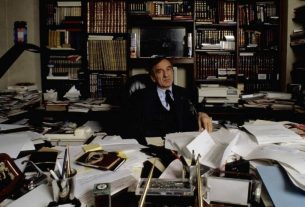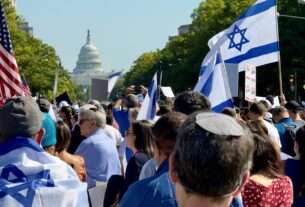Translated from the Russian by Valzhyna Mort
(English follows the Russian, below.)
“To write poetry after Auschwitz is barbaric,” philosopher Theodor Adorno famously wrote. To which poet Paul Celan (in Pierre Joris’s translation) retorted: “What concept of the ‘poem’ is being presented here? The arrogance of the one who dares hypothetically-speculatively to contemplate or poetically describe Auschwitz from the nightingale- or lark-perspective.” Celan, who survived the shoah and spent the rest of his life haunted by its horrors, refused the dangerous pretense of engagement without self-implication. Such abdication persists today in the staid pedagogy of disaster tourism evoked in the title of Polina Barskova’s “Auschwitz-Birkenau, A Guided Tour for American Students,” translated by Valzhyna Mort. This familiar mode of instruction suggests a petrified past can be surveyed from above, and abstracted into an uncomplicated, unchanging lesson to be applied to the present. But in Barskova’s poem the past refuses to stay put. Objects—“bowls, prosthetics, red- / framed glasses”—accumulate, their memory of bodily intimacies limning a bright absence, and the present is not a point plotted on a timeline, but a shore where the refuse of history is washed up by time’s horrible tide. And Auschwitz, the poem reminds us, is not an exhibition encased in glass, but a place where we still meet, revising the catastrophic with the small tokens of our living—the ashes of the speaker’s cigarette brush “the ashes made here, shed here.” There is no after Auschwitz. There is only what became of it, what becomes.
– Claire Schwartz
ОСВЕНЦИМ, ЭКСКУРСИЯ ДЛЯ АМЕРИКАНСКИХ СТУДЕНТОВ
I
Подъезжая на микроавтобусе под польскую деревеньку О.
Удивляю себя—чего это, я не чувствую ничего.
Вроде душа моя развороченная бесчувственная десна,
Развлеченье дантиста, роденбаховский город сна.
Главное двигаться словно вода в канале—то есть не двигаться.
Лишь шевельнёшь рукой
—сумасшедшие тени вмешаются в твой покой.
Все эти Розы, Людвиги, пронумерованные для нас,
Чтобы мы их пересчитывали, пока поступает газ.
Пересчитывали впрочем косвенно: горшки, протезы, очки,
С красной каёмочкой, с чёрной каёмочкой волшебные
башмачки,
Чемоданы, волосики, пепел, провисшие облака,
Студентки фиолетовая от холода рука
Впивается в зонтик. Кукушка
В Биркенау—скажи, сколько лет ещё
Мне навещать нравоучительные бараки?
Холодно холодно горячо:
Жмурки цивилизованного сознания.
Ничего не чувствую кроме стыда
Сбрасывать пепел Marlboro
На пепел, произведённый здесь, пролитый сюда.
II
Вот этот камушек есть памятник ему.
Вот это облако окурок лютик пёс—
Всё, что с собой он взять не мог во тьму,
Хоть до последнего не жаловался нёс.
Вот это дерево сортир скамейка мак—
Весь мусор ужаса, отчаянья дерьмо,
Я, расфуфыренный, самодовольный маг,
Несу тебе—валяй, смотри кино
Вещей, которые резвятся, как во сне:
Подмигивает смятое пенсне,
Кастрюлька хрюкает, будильник правит ночь,
Корябает огрызок-карандаш:
Владелец наш, кормилец наш, поилец наш,
Тебе и рады бы помочь
—не знаем как.
Вот этот камушек тебя последний знак.
Не-восклицательный. Заноза. Зонтик. Злак.
Auschwitz-Birkenau, A Guided Tour for American Students
I
When the minibus nears the Polish village of Ausch.,
I feel numb. My pneuma, a
cut open gum,
a game for a dentist, Rodenbach’s drowsy Bruges.
Focus on moving the way water in channels moves—which
it doesn’t. I stir—
and mad shadows disrupt my numbness.
All these Roses, Ludwigs, thoughtfully numbered for us,
to count, to recount through the gas.
The recount was roundabout: bowls, prosthetics, red-
framed glasses, fairy slippers laced black,
suitcases, hairs, ashes, sagging skies,
a hand of a female student purple from cold
clutches an umbrella. A cuckoo
of Birkenau, how many years more
will I visit educational barracks?
Cold, cold, cold, hot:
hide-and-seek of the civilized consciousness.
I am numb except for the shame
of brushing Marlboro ashes
on the ashes made here, shed here.
II
This pebble here is a monument to someone.
So is a cloud a stub a poppy a dog—
Whatever no one can carry into the night,
carrying it, no one complained.
This tree here WC buttercup bench—
the garbage of horror, despair’s filth,
vain, adorned, and duende’d, I
carry to You—watch this film
of things, whirling as in a dream:
a battered pince-nez winks,
a cooking pot snorts like a pig, an alarm clock squares the night,
a gnawed pencil scrapes:
Our Master, daily feeder and quencher,
here we are, glad to help—
but how?
This pebble here is the last sign of you.
A point. Of no exclamation. Splinter. Spike. Grain.
Polina Barskova is the author of twelve books of poetry and two books of prose in Russian. Her collection Living Pictures received the Andrey Bely Prize and is forthcoming in English with NYRB. Her selected poetry in English, Air Raid, is out this fall from Ugly Duckling Presse.
Valzhyna Mort was born in Minsk, Belarus. Her most recent poetry collection is Music for the Dead and Resurrected (FSG, 2020), named one of the best books of 2020 by The New York Times and the winner of the International Griffin Poetry Prize.
The post Auschwitz-Birkenau, A Guided Tour for American Students appeared first on Jewish Currents.


